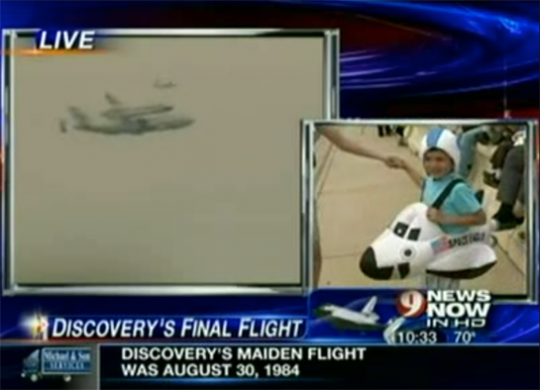The Discovery shuttle flew for the last time Tuesday, beginning in Cape Canaveral, Fla., on the back of a 747, looping around the monuments in Washington D.C., and landing in Virginia, where it will ultimately be transferred to the Udvar-Hazy annex of the Smithsonian Air and Space Museum.
In Washington, onlookers left buildings and stood on rooftops to watch the shuttle and its escort circle the city.
NASA retired the shuttle program last month with Discovery's final space flight, and as P.J. O'Rourke recently wrote, the state of the U.S. program is unclear:
But the U.S. space program is short of machinery, muddled about goals, and low in morale. The space shuttle has been retired. Thousands of NASA employees and contractors lost their jobs. We have no way to get a man into space except by asking Vladimir Putin, "Mother Russia, May I?"
The Bush-era Constellation program, with its moon and Mars capabilities, was canceled. Neil Armstrong called the decision "devastating." The Augustine Commission, an Obama administration panel of scientists, retired astronauts, and aerospace experts chaired by former Lockheed Martin CEO Norman Augustine, judged Constellation to be hopelessly behind schedule, underfunded, and over budget. I’m glad they didn’t judge me.
The new Space Launch System or SLS, the heavy launch vehicle that will replace Constellation’s Ares I and Ares V rockets, won’t be ready for a manned flight until at least 2021. Where the SLS will go is, as it were, up in the air. Lunar orbit? Asteroid? Lagrange point? (A Lagrange point is the place between two gravitational bodies where an object is held stationary in perfect equilibrium.) What if Jack Kennedy had declared we were going to put a man on a Lagrange point by the end of the decade? The nation would have been inspired to watch ballet in a suburb of Chicago.
In 2011, China launched more rockets into orbit than the U.S.—the first time ever, according to Gizmodo. Though the U.S. retains advantages in funding, the Chinese launched 19 rockets last year, while the U.S. launched 18; both were eclipsed by Russia, which sent 31 rockets into space.
When asked for advice Tuesday by a WUSA9 reporter, former Discovery astronaut Dr. Anna Fisher told a boy watching the shuttle, "Study Russian."
